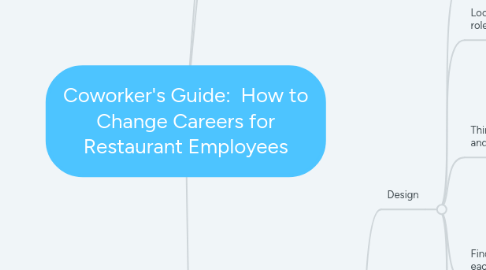
1. Discover
1.1. Determine where you are
1.1.1. You searched for this book for a reason
1.1.2. You are ready for a change but not sure what to do or how to start
1.1.3. You may have tried to apply to jobs outside of the industry but never get any responses
1.1.4. You are scared because you have no real skills other than restaurant skills
1.2. Decide if you want to get out of the restaurant industry
1.2.1. You need to decide why you want to change careers
1.2.2. List of possible reasons
1.2.3. Make the decision to try and commit to this plan
1.3. Assess your skills acquired in the restaurant industry + other skills
1.3.1. You have more transferable skills than you are probably giving yourself credit for
1.3.2. You just need to know how to word these
1.3.3. You need to take an inventory of all the ways you have contributed over the course of your restaurant career
1.4. Decide how much money you need to make
1.4.1. How do you get paid? Cash tips, salary, etc?
1.4.2. Be realistic about how much you are actually making now
1.4.3. Remember that the first job will likely not pay much, but you are going for a career that will become very lucrative
1.4.4. Don't forget about the added perks - health benefits, paid time off, sick days, paid holidays, 401k, bonuses, weekends and nights off, etc.
1.5. Research at least 5 jobs that fit the industry and salary both short and long term
1.5.1. Pick the top 5 types of jobs that you think you'd like: in example: sales, technology, retail, project management, finance
2. 20,000 words in 30 days
3. 4 Key sections:
3.1. Design
3.1.1. Narrow down to 3 job roles with long term potential
3.1.1.1. Remember you will likely start out in a support position - in example: receptionist, coordinator, call center rep, etc.
3.1.2. Look at the career path for each starting role
3.1.2.1. Look at the potential career paths for each of these 3 starter jobs - in example: receptionist > administrative assistant > coordinator > project manager
3.1.3. Think about culture and fit for the new role and industry
3.1.3.1. The culture of the corporate world is changing
3.1.3.2. It's more diverse than it used to be
3.1.3.3. Different industries still have different types of corporate cultures - in example: Financial companies still tend to dress more business like, where IT or Technology typically wears very casual or jeans
3.1.4. Find at least 5 job descriptions online for each role
3.1.4.1. Search for at least 5 different job descriptions for each of the three roles - you can search nationwide, as the requirements for these roles tend to be the same everywhere
3.1.5. Compare your current skills to the required skills in the job descriptions
3.1.5.1. Make a list of all of the skills you are finding that are repeated over and over in these 15 job descriptions
3.1.5.2. Check off the ones you have or are close to having (could figure out really quickly)
3.1.6. Figure out what skills you are lacking
3.1.6.1. Create a gap analysis of the ones you do not have and would be more difficult to attain quickly
3.2. Develop
3.2.1. Find three ways to acquire these new skills
3.2.1.1. Take the top three skills you are lacking and brainstorm and research ways to get these skills
3.2.1.2. Remember, you do not have to have these skills yet - you just need a plan
3.2.2. Write new resume and cover letters
3.2.2.1. With these job descriptions and skills analysis you will now write a new resume and cover letter
3.2.3. Update or create Linked In profile
3.2.3.1. Create a new Linked In profile
3.2.3.2. Start reaching out to anyone you know on Linked In to build your network
3.2.4. Post resume to job boards
3.2.4.1. Upload your resume to all the job boards and complete a profile
3.2.5. Brainstorm at least 3 people you know in this role or industry
3.2.5.1. Add them to Linked In
3.2.5.2. Ask them to meet with you for coffee
3.2.6. Practice interviewing and mind set skills
3.2.6.1. Interviewing in corporate world is very different than in the restaurant business
3.2.6.2. Understand the types of interviews and when to take them seriously
3.3. Deliver
3.3.1. Land interview
3.3.1.1. Prepare for the interview
3.3.1.2. Know what to wear and what to bring
3.3.1.3. Know how to sell yourself
3.3.2. Get job
3.3.2.1. Congrats you got the job!
3.3.3. Understand new role / lingo before first day
3.3.3.1. Research the lingo
3.3.3.2. Make sure you know where to go and who to meet on the first day
3.3.3.3. Some things to expect
3.3.4. Deliver great results with a 30-60-90 plan
3.3.4.1. Start the job with your own plan for success
3.3.4.2. Share it with your boss is you have a 1:1
3.3.5. Keep track of the value you are providing
3.3.5.1. Keep track of all the new skills you are developing - in example: new software, meetings, terminology
3.3.6. After six months, start over at Discovery to start preparing for your move to the next higher role / $$
